The Nexus 7 (2013) Review
by Anand Lal Shimpi on August 22, 2013 6:00 PM ESTPlatform Power & Battery Life
The new Nexus 7 moves to a slightly smaller battery compared to its predecessor (15Wh vs. 16Wh). The result however is anything but a reduction in battery life. ASUS and Google worked hard to reduce platform power consumption as much as possible. I instrumented both Nexus 7s and measured total platform power, excluding display, to look at the impact of the silicon platform (SoC, PMIC, DRAM, eMMC, WiFi, etc...). The results are beyond impressive:
Idle power is cut in half compared to last year's model. This is by far the most important improvement as most mobile usage models tend to have long periods of idle time. We'll see these power gains reflected in our web browsing test which does have significant periods of simulated reading time between web page loads. The power reduction while running Kraken grows to just over 20%, and even while running Geekbench 3 we see a 16% drop with the new Nexus 7. Only our offscreen 3D test manages to draw more power on the new Nexus 7 than the old one, and that isn't taking into account the nearly 5x increase in performance on the new Nexus. In fact, as impressive as these numbers are - they are even more impressive when you take into account performance. To make a long story short, don't worry about the ~7% decrease in battery capacity as there are enough improvements in platform power and performance (and thus perf per watt) to more than make up for the smaller battery.
We'll start out with our WiFi web browsing test. Like all of our battery life benchmarks we run this test with all devices calibrated to 200 nits and connected to 5GHz 802.11 WiFi (if supported). The test itself cycles through a bunch of desktop websites at a very aggressive frequency. Our test ensures that both the CPU cores and wireless stack can reach their deep sleep states during simulated reading periods. The test continues until the battery is depleted.
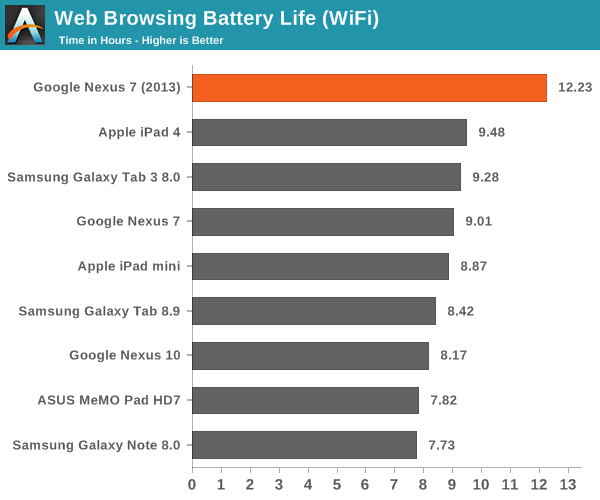
The new Nexus 7 does better here than any other small tablet we've ever tested. Remember that 50% decrease in idle platform power? That's exactly why we're seeing a 35% improvement in battery life compared to the original Nexus 7.
Our video playback test involves looping the playback of a 4Mbps 720p High Profile H.264 transcode of the last Harry Potter Blu-ray. All displays are calibrated to 200 nits.
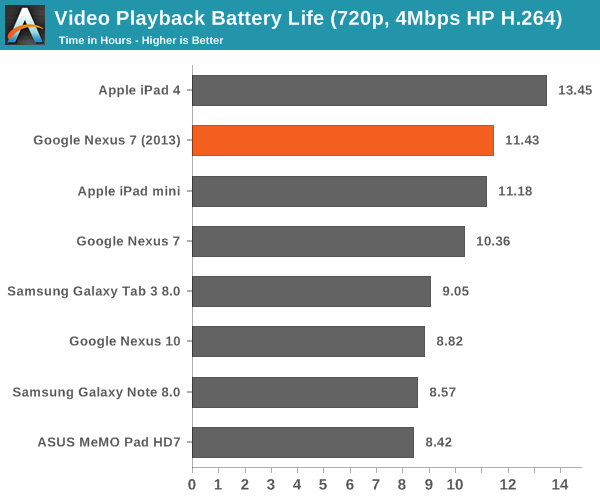
Video decode blocks are fairly well optimized to begin with, so there's not a ton of room for improvement here compared to last year's Nexus 7. Despite the ~7% shrink in battery capacity, the new model manages a 10% increase in battery life though. We also have the first small Android tablet capable of beating the iPad mini in a video playback test here - job well done ASUS/Google.
Our final test involves looping the Egypt HD benchmark until the battery is completely drained. Frame rates are capped to 30 fps to somewhat simulate actual gameplay and not penalize faster GPUs.
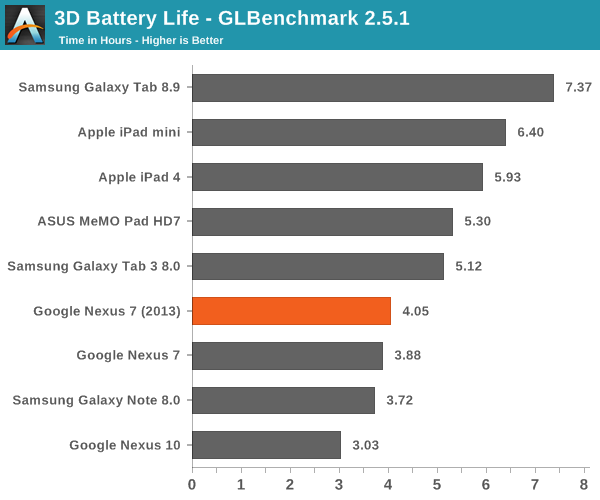
The new Nexus 7 manages to deliver slightly better battery life here despite driving higher frame rates and more pixels. Overall performance here isn't anything super impressive, the only average showing from the Nexus 7.
Google ships the Nexus 7 with an ASUS branded 7W charger, identical to the one you'd find in the box of a MeMO Pad HD7. Given identical chargers and battery capacities, there's no surprise the new Nexus 7 takes the same amount of time to charge as the MeMO Pad HD7 (~3.5 hours).
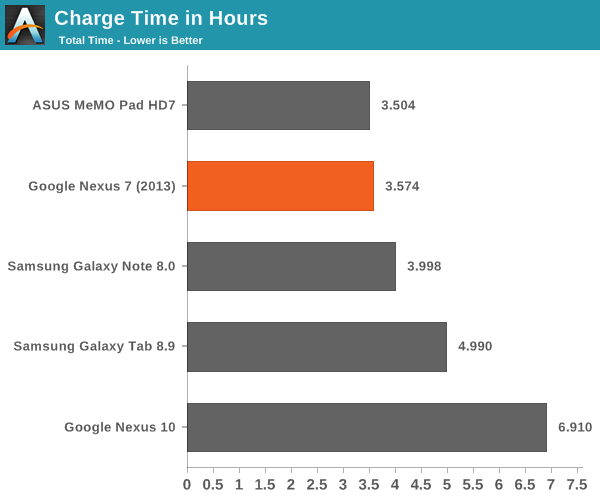
The new Nexus 7 also supports wireless charging by implementing the Qi standard. Charge time is a bit slower wirelessly as Qi can only charge at up to 5W. Brian tested Qi functionality in his mini review of the Nexus 7 and didn't have any issues.


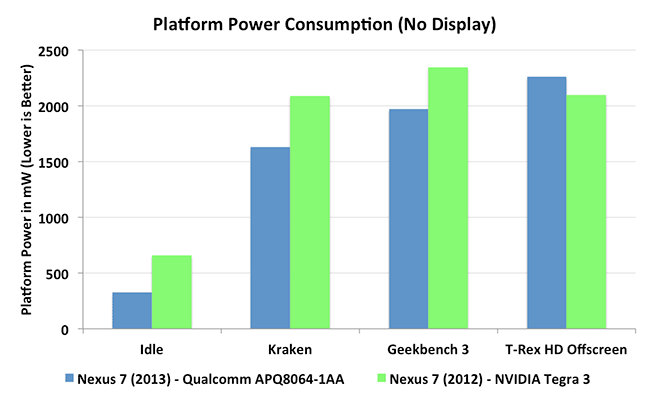
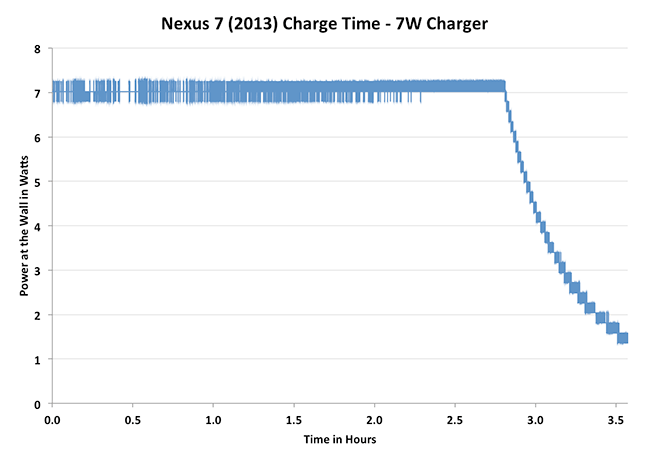








202 Comments
View All Comments
doobydoo - Sunday, August 25, 2013 - link
Retina is an Apple marketing term but the science behind it is not Apple's to change.Put simply, a retina device is a device which, when used at a normal viewing distance (11 inches for smartphones, for example) does not have discernible pixels for people with 20/20 vision.
That's the definition, period.
Whether it's useful to you or not depends on whether you have 20/20 vision, or perhaps whether you hold your device closer or not.
The iPad 4 is retina because it would typically be held further away from your eyes than a smartphone, whereas the Nexus 7 with its significantly smaller screen would be held closer (but also still qualifies as retina).
For perfect vision, the absolute best you can find in anyone, ever, at 12 inches you'd be looking at a possible perception of 700 PPI.
Fri13 - Thursday, November 14, 2013 - link
Now after a longer time when both has been released, a Nexus 7 (the 2013 model) and iPad Mini (with Retina display) there is no actual difference.Nexus 7 has 323 PPI while iPad Mini has 326 PPI so the difference is only a 3 pixels what is nothing even if other would have only 150 PPI. As that is small enough to offer a sharp text and pictures and in this case both are over 320 PPI what is over twice needed to offer sharp text and pictures. The first gen iPad mini was 163 PPI what was enough, but for many it isn't "enough" because they want specs to be updated no matter if there are no reasons to do so.
And you don't want to compare operating systems, it is useless as you don't want to compare filesystems, process schedulers, filesystem schedulers, memory management efficiency, network protocols stacks like TCP/IP or process threading etc etc. You want to compare only the graphical user interfaces like what user see, how they are designed (logic) and what functions does device offer for developers so users can post-install wanted software from different sources than just manufacturer own (so you can be in control of your device) and most important thing, how well does the devices work in ecosystem (== how well can all devices share data between each other no matter who is manufacturer or what software is used. Every device belongs to one and the same "ecosystem").
darwinosx - Thursday, August 22, 2013 - link
Android tablet apps are not close to iOS tablet apps in selection and quality. Anyone who owns a Nexus 10 knows this if they are truthful.There will be a new iPad Mini in a few weeks and Apple will settle all family business. The old iPad Mini sold dramatically better than the old Nexus 7 and this will be no different.
What you and Anand don't mention is that Nexus devices are sold at cost.
As I said earlier I have bought three of these as gifts in the last month or so. But the screen is too small for me and app quality and election is lacking. A retina iPad Mini is going to blow the doors off the Nexus 7 in sales. Watch.
smartypnt4 - Thursday, August 22, 2013 - link
Well, no one ever argued that...The iPad mini will sell more, regardless of how the specs compare. That's simply because there's a lot of people in this world that want something they already know how to use, and iOS is what the learned at the beginning of the smartphone race.
Now, that app selection thing: the advantage of the 7" form factor is that the apps built for phones aren't completely useless on this screen. After owning a N10 and now a 2013 N7 (with an iPad in between, mind you), I can say that the situation on the N10 was terrible. So many apps just didn't come close to being usable. The other bit is, I really don't use that many apps any more, so there may be some people in that camp. I can't say for sure due to my relatively small sample size (me and a few friends who care).
All in all, Apple has no excuse if they don't show up with a retina-fied iPad mini this fall. Last year, it was argued that the mini doesn't have an awesome screen due to cost, availability, and the power drain it'd suffer. The 2013 N7 shows that it's completely possible to do in today's world, regardless of what was possible last year. I really do hope Apple shows up with a good competitor specs-wise, because I'd hate to not have a choice as far as small tablets are concerned. We hardly have a choice on the large tablet side as it is.
mmarafie - Friday, August 23, 2013 - link
AgreedWarpGuN - Friday, August 23, 2013 - link
crap apple will never compete spec-wise with Nexus they will always be behind. Overpriced crap designed for the non-geek, Android is dominating with smartphones and tablets Apple is losing market shares everydayakdj - Friday, August 23, 2013 - link
WarpGun....what? Are you six years old? That's your offering to the discussion? Good grief....grow up a bit, then come back and join us for a real discussion. The two companies go back and forth every year beating each other in 'specs'. Just take a look at last years gear vs this years. Ridiculous comment, as the iPad (both mini and regular) are at the end of their cycle. And with this in mind, the iPad 4 still fairs pretty well against current competition even being a year old.The article hasn't anything to do with market share...but Apple has never 'lost' market share. Each iteration if iOS device has outsold the last. In fact, this past quarter the iPhone outsold YoY itself by an extra 5mil units. Get out of your basement, get a job, and try to contribute to the discussion at hand rather than spread your personal agenda
The new nexus 7 is one helluva tablet. An excellent review from a legitimate reviewer to boot. Isn't that enough to make you 'happy' to be an Android fan?
Miggleness - Friday, August 23, 2013 - link
This is the first time I paid attention to the size difference between the Nexus and iPad Mini. That's another big factor in my next purchase and the Nexus just feels too small.Thanks for the review Anand. This is the reason I keep coming back to your site.... twice daily!
ESC2000 - Sunday, August 25, 2013 - link
Actually the nexus displays more on its screen than the mini because of how many more pixels the nexus has even though the mini's screen real estate is about a third bigger. I've messed with the two next to each other and the nexus looks way better. Of course the nexus is much newer. Still I expect the new mini to be either overpriced or underspecced... or both like the first mini.doobydoo - Monday, August 26, 2013 - link
Actually, no it doesn't, because despite the increase in resolution, the Nexus doesn't shrink everything compared to its predecessor. It still displays less than the iPad Mini, because if it didn't everything would be too small.I also now don't believe that you've compared the two side by side because if you had, you would know this.